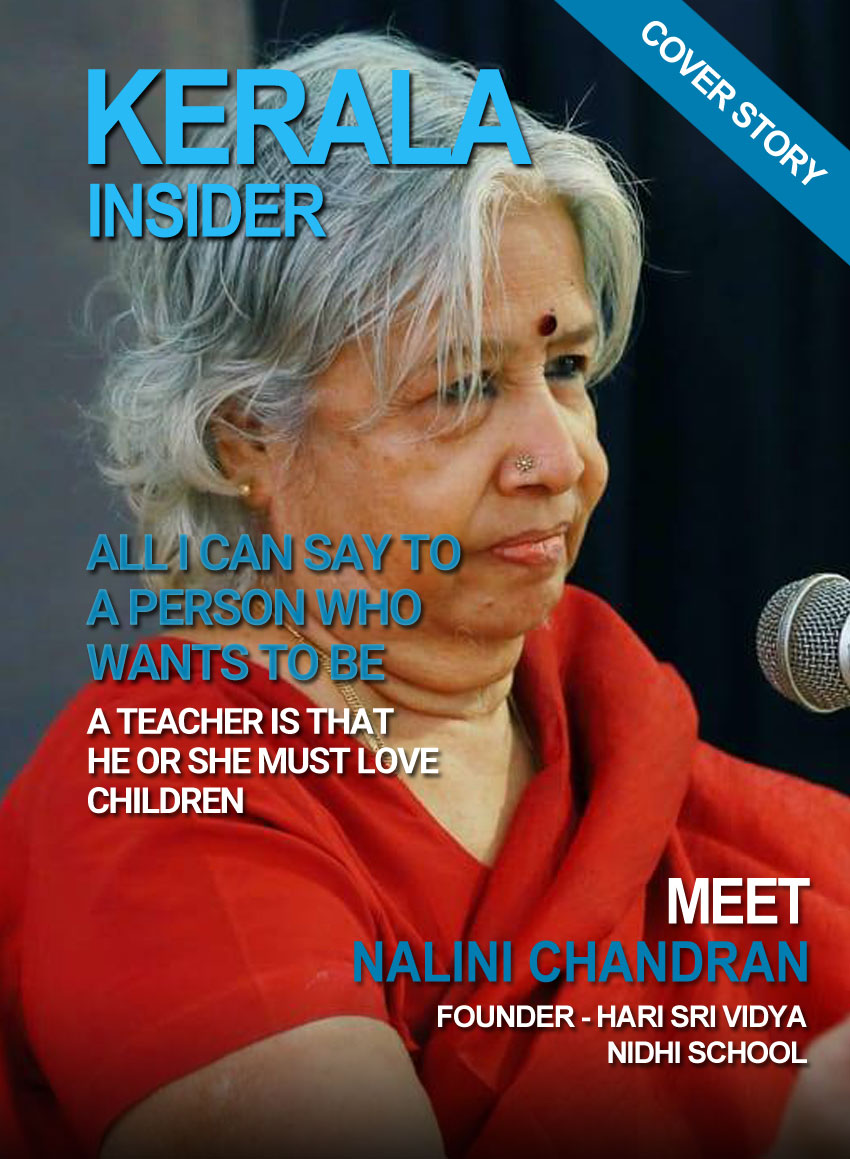The words gentle and sweet are most often used when we talk about women, yet powerful and strong are more suitable to describe the amazing females amongst us. There are so many inspirational and successful women in the world and many of them we fail to recognize. Nalini Chandran or our own Nalini Miss is gentle, kind, powerful and strong. She is admired by her students and everyone around her.
Nalini Chandran was born in Kannambra, Palakkad. She was the only daughter of a broad-minded father and was brought up confident and independent. She belonged to a traditional Nair family. Nalini Chandran married her best friend, Eashwara Chandran, a young lieutenant who was posted in Pune. Nalini worked in many schools around the country and has imparted her knowledge wherever she has been. She took active part in Army Welfare centres across India when she traveled with her husband. She lost her husband, Chandran, in 1979. She has 3 daughters Deepti Menon, Neema Varma and Bhavna Nair.
Nalini Chandran is the Founder and present Director of one of Kerala’s best-known ICSE/ISC schools, Hari Sri Vidya Nidhi School. The school was founded in 1978 with her husband and had only six students when it initially began. After she lost her husband she undertook the development of the school into her own hands and worked hard to raise the institution to excellence. It is through her hard work and determination that Hari Sri Vidya Nidhi School reached the heights of success it now boasts off.
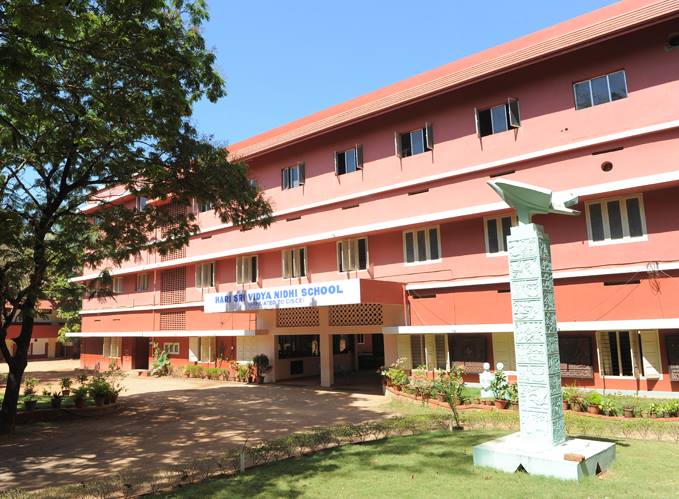
After starting Kerala Insider, I have been eagerly waiting to publish an interview with Nalini Miss. She is an individual who has influenced me in more ways than one. What I ardently admire about her is her energy and her never say die attitude. Apart from the achievements, accolades and awards she has garnered over the years, in this interview I have put together a few questions I was curious about her. In conversation with this incredible woman, we learn more of her journey, her love for everything she has done and the knowledge she has imparted over the years.
How did you discover your passion towards teaching? As a teacher, what are some of the most important lessons that students have taught you?
As an Army wife, the only profession that I could take up, given the nomadic nature of our life, was teaching. Hence, I taught in schools across the country. Right at the start, I realised that I had a flair for teaching, and more importantly, the knack of creating a rapport with young ones. That is where I decided that, come what may, I would be a teacher.
I have learnt much from my students. They have taught me to remain young, even today at the age of 83, and to see the world through their eyes.
I have always believed that a healthy combination of curricular and co-curricular activities makes a child, healthy, happy and wise. When students go away after their twelfth Boards, what we want is for them to shine in the world and find their own niches.
Hari Sri is your baby. How challenging was it to bring it to this level?
When I started Hari Sri, I was in my late thirties. We had decided to move to Thrissur where I could start my school. My husband was looking forward to his last posting, hopefully in Cochin. However, that was not to be as he passed away, and I was left alone, with three young daughters to bring up.
It was a hard, arduous journey. I started with six students, and plodded on, against all odds. At that time, Thrissur was a conservative town and a single lady running a school was a rarity.
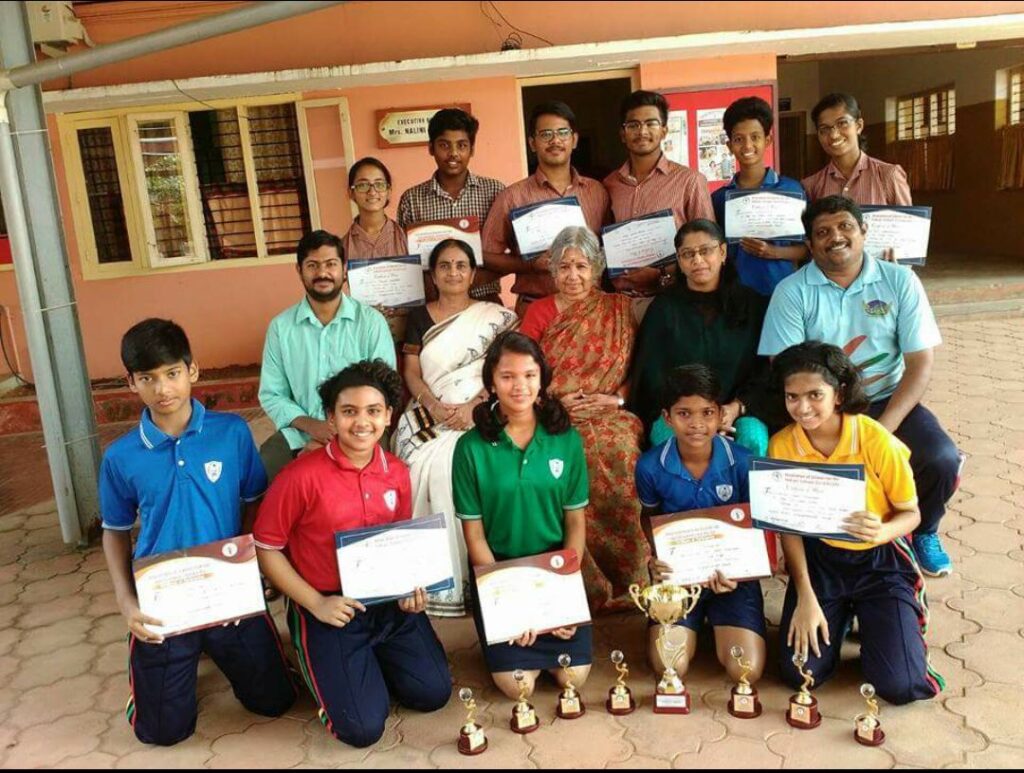
42 years later, the road has been a long and challenging one, with roadblocks and free runs, but when I sit back and see the path I have come by, I am satisfied. Today, Hari Sri Vidya Nidhi is a school to reckon with.
For us, you are not just a teacher, but a leader. How would you describe your leadership style?
Thank you for saying so. I have always considered myself a motivator. I believe that leaders are influencers. My style has always been one of opposites. I believe in being firm when required, and friendly at other times. However, I am a stickler for discipline and meticulousness, and I do not let my standards drop ever.
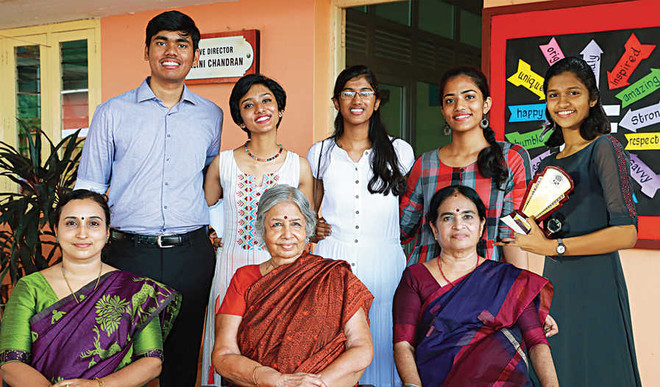
Any building needs a strong base. For you, it was your set of teachers. How do you grab in the best teachers and make sure they fall in love with Hari Sri?
Teachers have always been the backbone of Hari Sri. Over the years, I have realised that some of the most dedicated and effective teachers I had, when I founded Hari Sri, did not have the right qualifications. Today, of course, qualifications are mandatory, but they alone do not make good teachers.
Once a teacher joins me, I train her personally, and she observes the way I handle the classes and my students. I have always maintained that a teacher should go down to the level of her students, and hence, the younger the children, the more the teachers need to do to catch their attention. I tell the teachers to joke around and do funny things. In Hari Sri, we are forever coming out with innovative programmes and maybe, that is one reason why my teachers stay on with us.
You were far ahead of the times when it came to education. You realized the importance of the English language, extra-curricular activities and sports. You showed us the importance of subjects like Commerce and Humanities. The list is endless. Where do you get such vision and how do you implement it in the right way?
I feel all this stemmed from my love of the English language, which is something I inherited from my father, himself a very humane and erudite person.
Having learnt the dance form of Kathakali for seven years, and having participated in various competitions over the years, I found that it was these activities that honed my personality and made me the person I am today. I was equally active in sports and imbibed a sportsman spirit early in life.
I have always believed that a healthy combination of curricular and co-curricular activities makes a child, healthy, happy and wise. When students go away after their twelfth Boards, what we want is for them to shine in the world and find their own niches. I am happy to see that we have been able to achieve this.
What are your views on the New Education Policy suggesting changes to the medium of instruction in schools? How important is it to introduce English to students in primary classes?
The New Education Policy has some good suggestions which will benefit future students by making them use their minds instead of mere rote learning. Surprisingly, most of the ideas that have now been added in the NEP had been implemented by me almost thirty-five years ago.
In Hari Sri, we have a three-language formula, where Malayalam, the mother tongue, is given a lot of importance right from the start. Hindi comes in in the third standard and is of a lower level than that taught in the north. I strongly feel that we should have a link language in the country, and if it is Hindi, it should be taught, not from the examination point of view, but from a colloquial one. For example, when the Prime Minister speaks in Hindi, many people down south do not understand him.
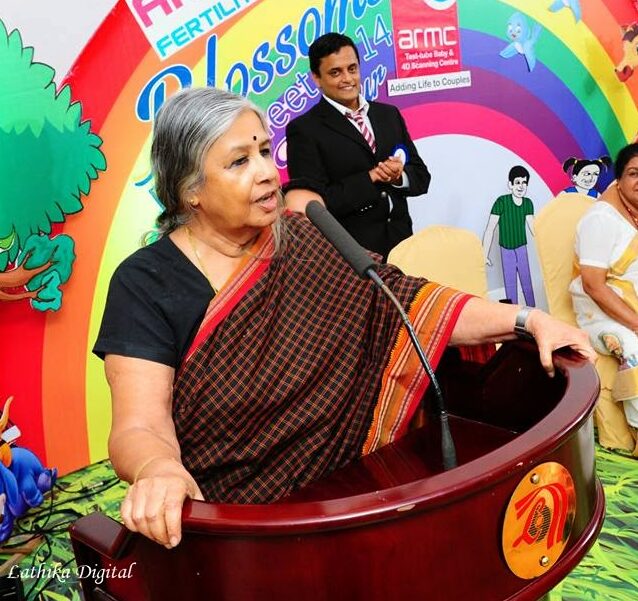
Similarly, if people in the south are learning Hindi as an extra language apart from two other languages, people in the north should also be expected to learn an extra language, preferably a south Indian one.
English is the medium of instruction in school. We are particular that children should learn English right from the start. That makes them fluent in the language, which is of immense significance when they grow up and turn into citizens of the world.
Also, our education system should ensure that any child who has passed the twelfth standard should be eligible to write the entrance examinations, instead of being forced to go into entrance coaching centres which have mushroomed across the country. In fact, if only the entire country could have one curriculum right across, it would help students immensely.
The slogan “Let the Peal of Harmony be the Appeal of All Religions” has made a great impact upon us. How relevant do you think it is in these times?
We adopted this slogan after the success of a religious pageant in school which was based on the equality of all religions, a lesson that we teach our students who come from various backgrounds.
Given the present scenario, I feel that this is a truly relevant slogan because the day we get rid of religious differences and treat everyone with love and compassion, the world will become a better place. In school, we celebrate all the festivals with equal gusto because we are Indians first, as also citizens of the world.
You have the incredible talent of remembering the names of all the students you have taught. You call them by their names ages after they have left school. What is the secret? Or do you have an amazing memory?
When the school started, there were just six children. Today, there are over a thousand eight hundred children.
I had an incredible rapport with all the children I taught. We were like one family and my children could come and talk to me and confide in me. Every student of mine was my child. Maybe, that is the reason why I could remember all their names,
Do describe your relationship with Lord Hanuman. When did this admiration start?
My love for Lord Hanuman started when I did the Ramayana back in the 1980s with my four-year-old students. It was a labour of love and I had put my heart and soul into the choreography. The music was recorded and a few days before the show, I found, to my horror, that the cassettes were not working. I tried my level best, trying out a number of cassette players, but to no avail.
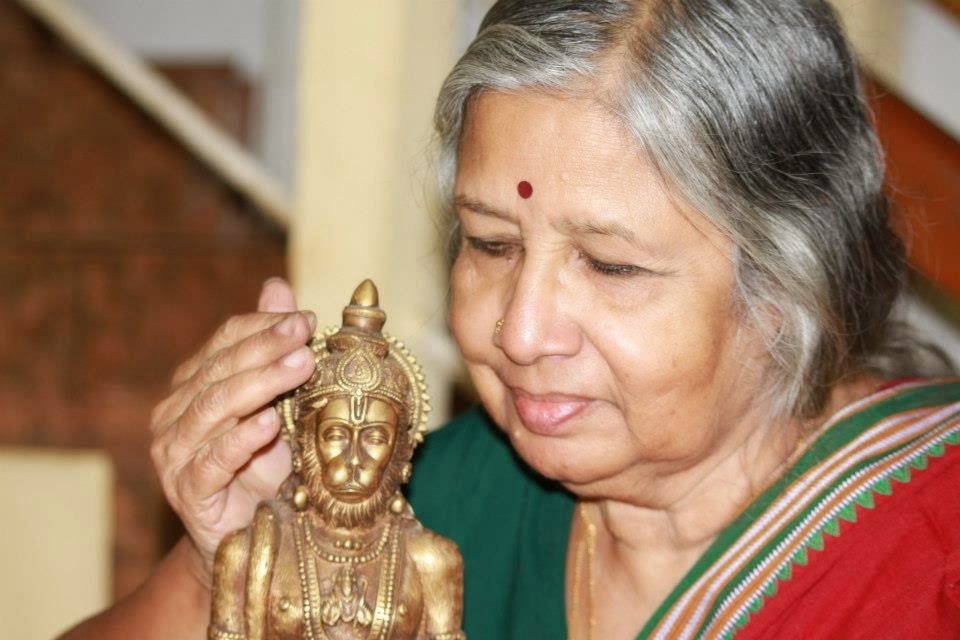
It was then that someone asked me if I had gone to the Hanuman temple. I rushed to the nearby Sri Rama Temple, placed all the cassettes before the Hanuman shrine and prayed with all my heart.
When I got home, and played the cassettes, they worked perfectly. That was when my relationship with Lord Hanuman started. He has always been by my side since then, guiding me in whatever I do.
“Miles to go before I sleep.” Hari Sri-ites cannot get enough of Nalini Miss. What are the miles you would still like to conquer? What drives you at this age?
I look at the school I founded and my heart fills with pride. And yet, there are many more things I would like to do still.
For example, I do wish we could have a uniform curriculum across the country that would benefit students all over. I have hope in the New Education Policy that has been formulated and I do hope that it is implemented in the right spirit.
I would also like to bring the Ganga to life. This has been a dream for some time now and I hope that I will be able to put it out some time in the future. As you put it, “I have miles to go before I sleep.”
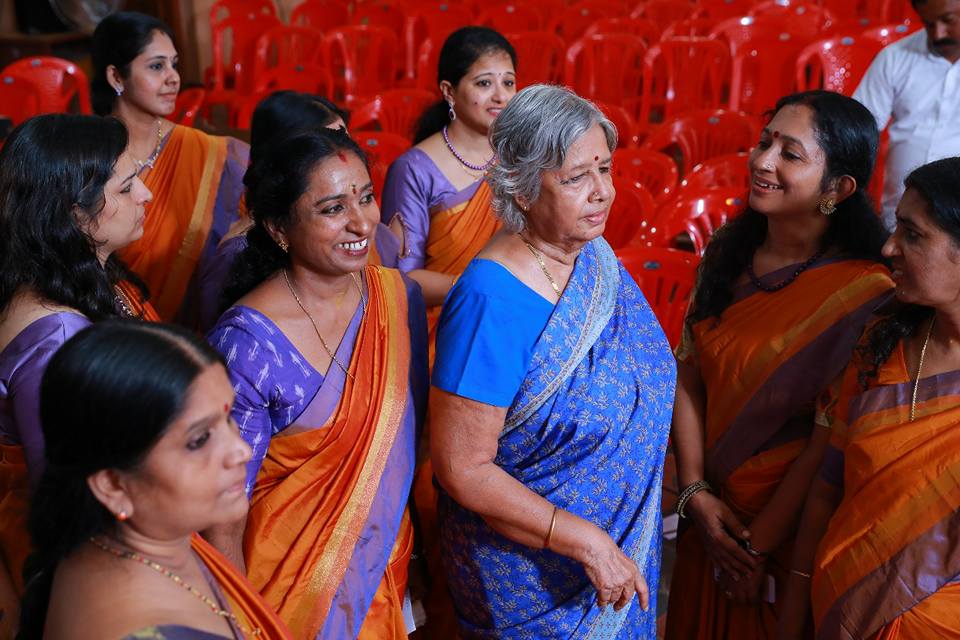
Is there one piece of advice you would like to offer to anyone who wants to be a teacher?
All I can say to a person who wants to be a teacher is that he or she must love children. That is the first quality a teacher requires. Apart from that, a teacher must be natural when she is with the children, create a rapport with them and go beyond mere academics. Teachers have a great influence on their students, and they can make them or mar them. So, teachers should be role models that children want to grow into.

